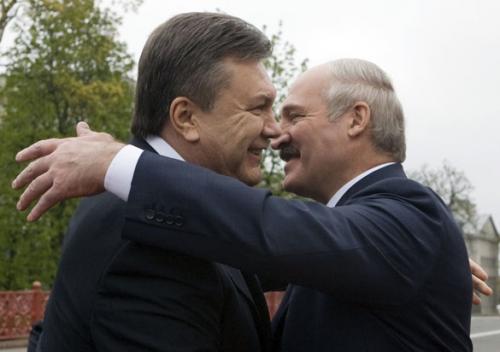
The West Treats Ukraine Differently to Belarus
Publication: Eurasia Daily Monitor Volume: 8 Issue: 137
By:

On June 28, an open letter to President Barack Obama was signed by nineteen prominent experts that called for “additional measures” to visa denials and economic sanctions with the aim of “bringing about the immediate release of all political prisoners in Belarus” (www.cepa.org, June 28). On July 7, the US Helsinki Commission supported the adoption of the Belarus Democracy and Human Rights Act of 2011. The open letter called for additional support to the Belarusian opposition and denial of international financial assistance “as long as political prisoners remain in jail.” “Now is not the time to throw Belarus’ dictatorship a financial life preserver,” they argued. The open letter looked forward to “Belarus post-Lukashenka” with a democracy, market economy, free elections and “rules-based transparent governance” (www.csce.gov, July 7).
A growing number of Ukrainian citizens would also like to look forward to a “Ukraine post-Yanukovych” built on these four factors. The Heritage Foundation’s January 2011 index of Economic Freedom gave Ukraine the worst ranking in Europe, while Forbes magazine ranked Ukraine as fourth out of the ten worst economies in the world. Belarus was not on the list (https://blogs.forbes.com/danielfisher/2011/07/05/the-worlds-worst-economies/).
But, will there ever be such an open letter on democratic regression in Ukraine or a “Ukraine Democracy Act” sponsored by the US Helsinki Commission?
On June 23, the US Helsinki Commission sponsored a far more moderate Congressional Statement on “Ukraine’s Democratic Reversals” (https://csce.gov). The statement did not call for the suspension of international financial assistance or any form of visa denials or sanctions, or for the release of political prisoners. Indeed, there is reluctance in this and other documents to use the term “political prisoner” in relation to Ukraine. The statement talks of “intensified pressure on opposition leaders, even selective prosecutions” targeting former government ministers as “politically motivated acts of revenge” to remove them from politics and elections.
As of June 7, the Viasna Human Rights Center listed seven accused, 13 suspects and 31 convictions, or a total of 51 individuals who could be classified as politically persecuted in Belarus (https://spring96.org/en/news/41575). The majority of the 51 are linked to riots following the December 2010 presidential elections when the authorities over-reacted following elections which were deemed by the OSCE to have not been held in a democratic fashion.
The Ukrainian Helsinki Human Rights Union and other NGOs in Ukraine have collected evidence of close to 50 people subjected to political persecution in Ukraine. These include nine leaders of the fall 2010 anti-tax code protests, Yulia Tymoshenko, and twelve members of her 2007-2010 government, and 20 members of the “Tryzub” and Svoboda nationalist groups charged with “hooliganism” and “terrorism.” There are also three environmental activists, one Russian exile and Hanna Sinkova, imprisoned since March for frying an egg on a monument to Russian-Ukrainian friendship. Indeed, 47 Ukrainians are nearly as many as 51 Belarusians persecuted for political purposes and therefore it is time for Western policymakers to stop pretending that political prisoners only exist in Belarus.
Ukrainian appeals to the outside world about the return of political persecution in Ukraine have largely fallen on deaf ears. As they state: “In 2010 political prisoners appeared in Ukraine” (https://zik.ua/en/news/2011/02/26/274510). A growing list of Ukrainian activists have called upon Western governments and international organizations to introduce visa denials to senior officials (https://www.helsinki.org.ua/index.php?id=1307592518), a policy which is also ignored although it could change if Tymoshenko is jailed.
The Czech Republic granted political asylum to Economics Minister, Bohdan Danylyshyn, itself a signal that an EU member believes there to be political repression in Ukraine. Former Czech President, Vaclav Havel, described Russia, Belarus and Ukraine as “dictatorship in gloves” (Kyiv Post, March 11).
Roman Besmertnyi witnessed the December 2010 arrests as Ukraine’s Ambassador to Belarus in 2009-2011. He lambasted the Tymoshenko trial as “98 percent of that which is taking place in Belarus” on the Shuster Live television program (June 24). Our Ukraine-People’s Self Defense, with which he is affiliated, issued a similar statement.
Prison conditions in Ukraine are as bad as Belarus and worsening. The number of people dying in custody in Ukraine is on the rise – 26 died in the first half of 2011 and 51 in the whole of 2010. In comparison, 23 died in the course of 2009 when Ukraine was classified as “free” by Freedom House (Ukrayinska Pravda, July 5).
Ukraine has refused to support the position of the EU in denouncing political repression in Belarus citing trade and historical ties as justification. In reality, the Ukrainian side’s calls for not isolating Belarus are in solidarity with Lukashenka whose fraudulent re-election in 2006 was greeted by Party of Regions leader Yanukovych. Besmertnyi was removed as Ambassador after he criticized the Yanukovych regime’s unwillingness to join the EU’s condemnation. During Yushchenko’s presidency Ukraine regularly joined the EU and US in condemning human rights abuses in Belarus.
Kontradetenko’s article “Is Ukraine building a new Belarus?” compares Lukashenka and Yanukovych’s similar worldviews (Ukrayinska Pravda, March 1). Indeed, both are economic nationalists vis-à-vis the West and Russia, they both came to power in free elections and proceeded to dismantle their democracies. Yanukovych’s family origins are in the hamlet of Yanuky in Belarus where the surname “Yanukovych” is quite common (see interview with Besmertnyi, Ukrayinska Pravda, June 15).
Yanukovych has never overseen a democratic election in four elections on his watch from 1999-2010 as Donetsk Governor, Prime Minister and President. At meetings in Washington and Brussels think tank and election experts and policymakers express disbelief that Ukraine’s October 2012 parliamentary elections will be held in accordance with democratic practices. Yanukovych ignored mild Western criticism of election infringements in the 2010 local elections and believes he won the 2004 elections –while denying election fraud took place (see interview with Yanukovych in www.bbc.co.uk/ukrainian, February 11).
Judicial reform in July 2010 marginalized the Supreme Court out of revenge for annulling his 2004 second round election which he remains convinced was “stolen” (Ukrayinska Pravda, December 4, 2008). As revealed by US cables leaked by Wikileaks, Yanukovych believes there was a Western conspiracy and “coup” against him in 2004 to deny him the presidency (https://zik.ua/en/news/2010/12/04/260115). Yanukovych and his administration have denied every aspect of Western criticism of selective use of justice, media censorship, non-democratic elections and over-centralization of power, which has led to parliament becoming a rubber stamp institution for the first time. At the same time, Western policymakers and ex-ambassadors continue to confusingly state that a major difference between Belarus and Ukraine is that the latter listens to Western criticism. The US Helsinki Commission Statement on Ukraine repeats the illusion that Yanukovych will take into account criticism contained in an April Freedom House report (https://www.freedomhouse.org/uploads/special_report/98.pdf).
Yanukovych, who was perceived as a “re-born” democrat by many Western policymakers in last year’s Ukrainian elections, was an illusion – as was pointed out by Jamestown analysts during the 2010 elections when it was a minority viewpoint. Eighteen months later that viewpoint is now held by a majority. It is taking a lot longer for Western policymakers to understand that the differences between Lukashenka and Yanukovych are also illusionary and merely a question of their time in office. Yanukovych is undermining Ukraine’s democracy at a far faster pace than did Lukashenka in the 1990s.




